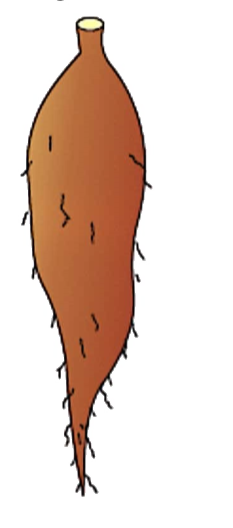Adventitious roots are
those arising from any part of plant other than radicle
found only in monocots
found in bryophytes also
all of the above
The correct Answer is:A
Step-by-Step Solution:
1. Understanding Adventitious Roots:
- Adventitious roots are defined as roots that arise from any part of the plant other than the radical (the embryonic root). This means they can develop from stems, leaves, or other parts of the plant.
2. Types of Root Systems:
- There are three main types of root systems:
- Taproot System: Characterized by a primary root that develops from the radical and persists throughout the plant's life.
- Fibrous Root System: Commonly found in monocots, where the primary root is short-lived and replaced by numerous fibrous roots that emerge from the base of the stem.
- Adventitious Root System: These roots can be found in both monocots and dicots, growing from various parts of the plant.
3. Examples of Adventitious Roots:
- Adventitious roots can be found in plants like banyan trees (a dicot) and asparagus (a monocot). This shows that they are not exclusive to one type of plant.
4. Clarifying the Options:
- Option A: "Arising from any part of the plant other than radical" - This is correct as it aligns with the definition of adventitious roots.
- Option B: "Found only in monocots" - This is incorrect because adventitious roots are also found in some dicots.
- Option C: "Found in bryophytes also" - This is incorrect since bryophytes do not have true roots; they have root-like structures called rhizoids.
- Option D: "All of the above" - This is incorrect as not all previous statements are true.
5. Conclusion:
- The correct answer is that adventitious roots are those that arise from any part of the plant other than the radical.
Final Answer:
Adventitious roots are those arising from any part of the plant other than the radical.
---
- Adventitious roots are defined as roots that arise from any part of the plant other than the radical (the embryonic root). This means they can develop from stems, leaves, or other parts of the plant.
- There are three main types of root systems:
- Taproot System: Characterized by a primary root that develops from the radical and persists throughout the plant's life.
- Fibrous Root System: Commonly found in monocots, where the primary root is short-lived and replaced by numerous fibrous roots that emerge from the base of the stem.
- Adventitious Root System: These roots can be found in both monocots and dicots, growing from various parts of the plant.
- Adventitious roots can be found in plants like banyan trees (a dicot) and asparagus (a monocot). This shows that they are not exclusive to one type of plant.
- Option A: "Arising from any part of the plant other than radical" - This is correct as it aligns with the definition of adventitious roots.
- Option B: "Found only in monocots" - This is incorrect because adventitious roots are also found in some dicots.
- Option C: "Found in bryophytes also" - This is incorrect since bryophytes do not have true roots; they have root-like structures called rhizoids.
- Option D: "All of the above" - This is incorrect as not all previous statements are true.
- The correct answer is that adventitious roots are those that arise from any part of the plant other than the radical.
Adventitious roots are those arising from any part of the plant other than the radical.
Topper's Solved these Questions
Similar Questions
Select correct statements from the following:
a. In the majority of the dicotyledonous plants, the direct elongation
of the radicle leads to the formation of the primary root.
b. In monocotyledonous plants, the primary root is short-lived and is replaced by a large number of roots. These roots originate from the lowermost node of the stem and constitute the fibrous root system.
c. Adventitious roots are found in Monstera and banyan tree.
d. The fibrous root system is found in wheat and mustard plants.
View Solution[A] : In creepers, leaves are produced upon the nodes.
[R] : Adventitious roots arise from the nodes.
View SolutionAdventitious roots absorb moisture from atmosphere in
View SolutionWhich kind of modification is seen in the given diagram?

(a) Tap root for storage
(b) Adventitious roots for supports
(c) Adventitious root for storage
(d) Tap root for respiration
View SolutionAdventitious roots originate directly from the radicle. (True/false)
View SolutionA: Tap root system is that which arises from the radicle of seed.
R: Adventitious roots can also arise from the radicle.
View SolutionAssertion : Prop roots develop mostly from horizontal branches of main stem.
Reason : Adventitious roots may perform mechanical supporting function , working as ropes of a tent .
View SolutionAdventitious roots of _____ get swollen and store
View SolutionAll given modification belong to adventitious roots, except
View SolutionName any one plant in which adventitious roots develop chlorophyll and photosynthesise.
View Solution
